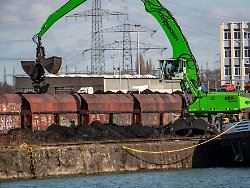Wednesday October 27, 2021
Energy costs and raw materials
Import prices are rising faster than they have been in 40 years
German companies sometimes have to pay significantly more for goods from abroad. Experts reckon that they will in turn add the costs to their products and thus ultimately reach consumers.
In September, due to significantly higher prices for oil, gas and some food items such as coffee, German imports rose more than they have been in over 40 years. The import prices rose by 17.7 percent compared to the same month last year, as the Federal Statistical Office announced. The last time there was a larger increase was in September 1981 in the wake of the second oil crisis, at 19.5 percent. Import prices had already risen sharply in the previous months: in August the increase was 16.5 percent, in July 15.0 percent.
Experts expect that the more expensive imports will also have an impact on the cost of living of German consumers. “This avalanche of costs will drive consumer price inflation further up in October and November,” said Commerzbank chief economist Jörg Krämer. At 4.1 percent, the inflation rate is currently at its highest level since 1993. Many economists assume that it will move in the direction of five percent in the coming months. For October, for example, a value of 4.4 percent is expected. The statistical office published a first estimate this Thursday.
The sharp rise in import prices is mainly due to the development of energy: Imports were 107.1 percent more expensive than in September 2020, when the Corona crisis drove energy prices down. The price premium for natural gas was particularly high at 170.6 percent, while for crude oil there was an increase of 75.5 percent. 135.7 percent more was charged for imported hard coal. Without taking energy into account, import prices rose by just 10.1 percent.
Significantly more had to be paid for numerous intermediate goods. For sawn and planed wood, for example, 64.6 percent more had to be flaked than for one year. Pig iron, steel and ferro-alloys rose by 60.9 percent. The prices for many imported agricultural goods also rose noticeably: green coffee rose by 44.8 percent, grain by 30.3 percent. The background to the rising prices is also the increased demand in the course of the global economic recovery from the Corona crisis.
